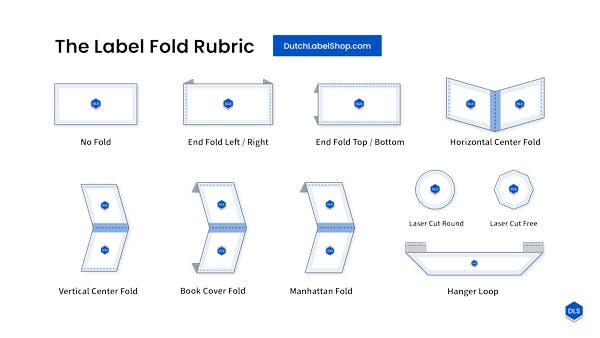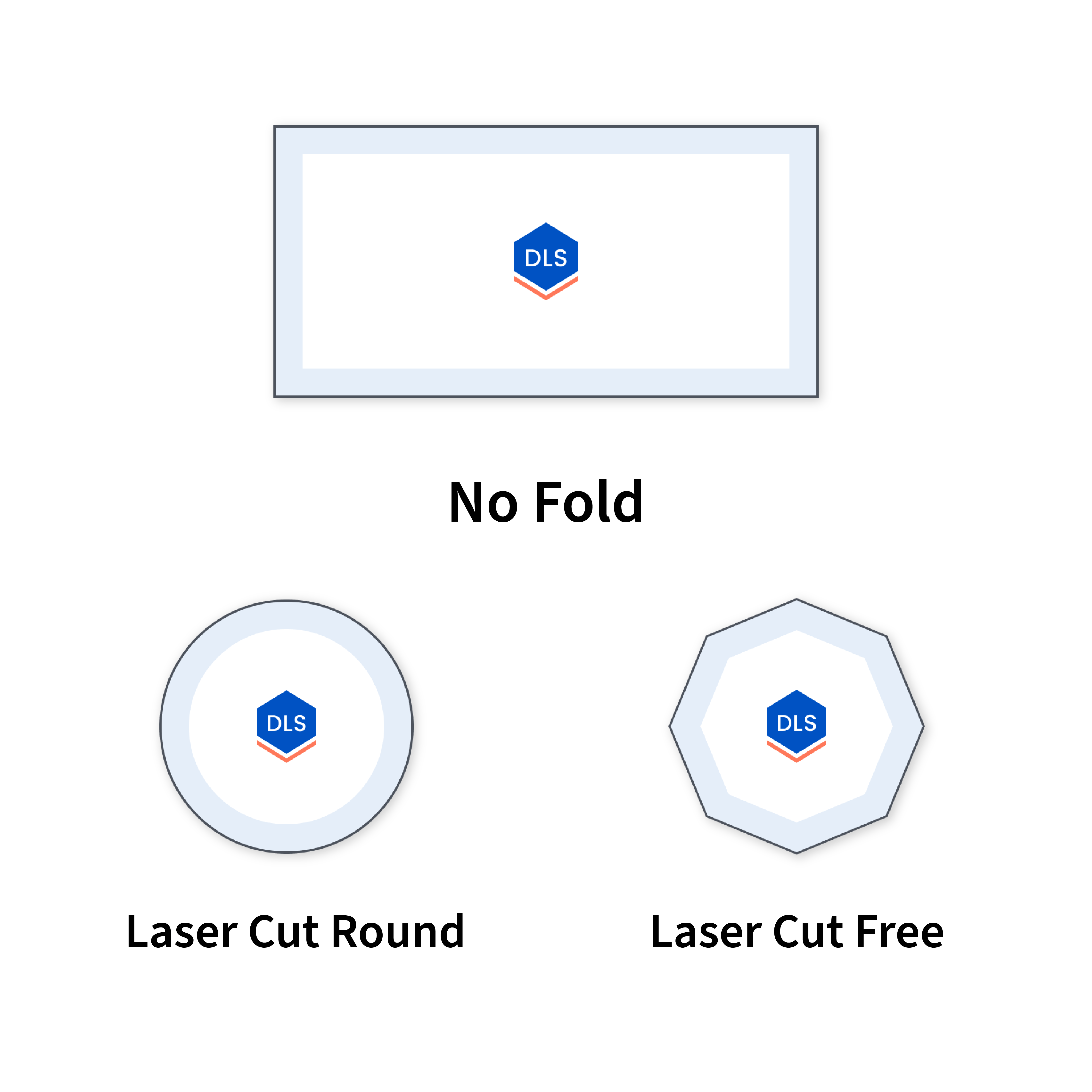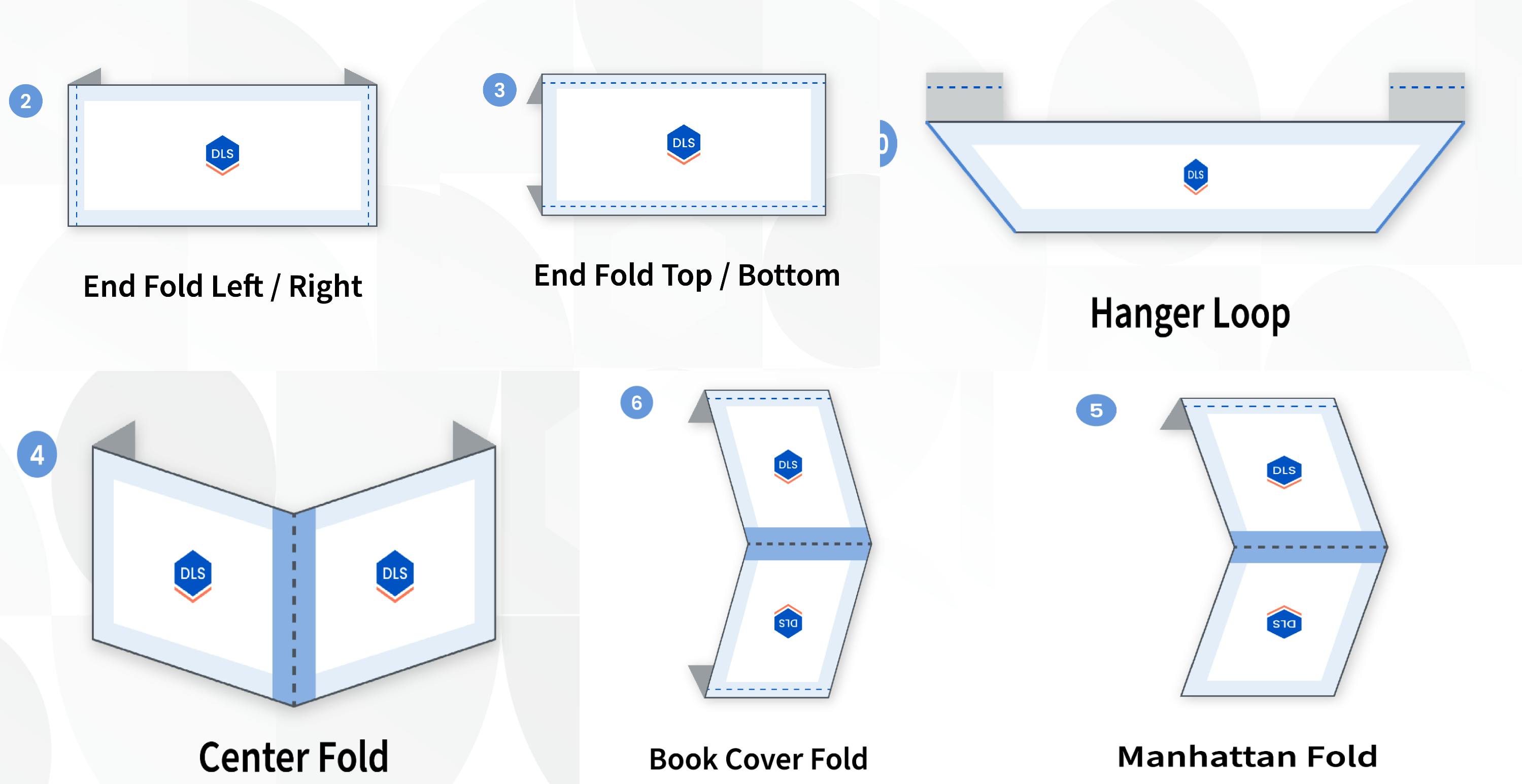Selecting a Brand Label that Works with Your Products
Want a clothing label folded, flat, or even a unique shape? We look at all the different shapes and folds clothing labels come in to help you design your perfect labels.
Brand Labels come in many Shapes and Sizes
Brand labels come in many shapes and sizes with an almost endless variety of folds and seam allowances. This may seem a bit overwhelming in the beginning, but you’ll find your perfect shape and fold for your sewing labels once you know what to look out for.
We suggest starting out by deciding the overall shape of the label. Do you want it to be a classic rectangle, or a unique custom shape? Whatever you choose will form the basis of your label. From there, you can decide whether or not it will have folds added to accommodate your ideal placement and finished look.
Choosing the Best Shape for Your Label
The shape of the label refers to the overall shape that it will take when it is flat. You can select classic label shapes like rectangles or squares, or completely customized shapes that match your branding. Once you decide on a shape you can add additional seam allowances or folds. Folds can be important for achieving a neat finish and for creating double-sided labels, although they may not be necessary depending on where you want the label to sit. If you want labels with an adhesive iron-on backing, a folded label will not be possible, so you’d choose a flat option.

Clothing Labels Without Folds
Flat Straight Labels
Flat straight labels include any labels that are rectangular or square shaped. The edges of these labels are usually laser cut which gives them sealed edges that will not fray, and can be sewn directly onto any garment or item “as-is”. This shape is extremely versatile for many different applications, and is an excellent choice for cotton labels. It can be left flat for a finished label without any folds, or folds can be added to a straight shape which turns it into a centerfold, end fold, or miter fold label. For additional versatile options, explore our collection of neck labels, specifically designed to impart a professional touch to your garments.
Application: A flat no-fold label can be attached by sewing on all 4 sides, left and right sides only, or across the top edge to multiple spots within a garment or item. This shape is perfect for iron-on labels, too. The adhesive backing can be added when ordering flat labels, which make for quick attachments especially where a standard sew-in label can't easily be applied.
Custom Shape Labels
Whether you’re looking for a geometric or organic shape, custom clothing labels can be made to match almost any design. Dutch Label Shop uses laser cutting because it’s very precise and leaves edges smooth and sealed, so they won't fray. When designing your custom-shaped labels, pay attention to how the shape will sit within a garment (or on top of an item) so you can make sure there is a place to attach them properly. Your custom-shaped labels will need to have seam allowances already included in your design, as you typically will not be able to add those separately once they are sent to production.
Application: Depending on the custom shape, you can choose to attach directly at an edge, include a seam allowance or tab in your design to fold over, or use an iron-on adhesive backing.

Clothing Labels With Folds
Some label folds are well suited to a variety of garments, and some have more specific needs. Getting the right fold type is a very important part of creating your brand labels because it will impact how the label can be attached, whether the underside of the label is visible, and if your logo stays centered once applied.
One of the best ways to narrow down your fold type is to first envision the final placement of the label on your garment or item. Is the label sitting flat against the back neck or waistband? Or is it sewn discreetly into a side seam? Or do you want your brand label placed over a hem so that your logo is visible on the outside? There are no rules about where your brand label has to go within a garment, but we recommend choosing a spot where someone can see the label while your item is on a hanger or displayed in a shop.
Deciding what to include on your brand label can also help to dictate the size and fold of the label. For example, a centerfold can accommodate more information since there are two sides to the label, with the wrong side of the label neatly hidden on the inside of the fold. If you just have one or two pieces of information (like a brand name and est. year) then you may not need a label with two sides. In that case, an end fold or miter fold label might look more intentional and will sit more smoothly in a garment when being worn.
End Fold Left/Right Label
An End Fold Left/Right label is a straight label shape that has folds on both the left and right sides. The folds create softer edges along those sides and will work well for landscape-orientated designs, like brand names and logos. This style is often used by high-end designers because the folded-edge finish looks very professional.
Application: These labels are sewn into the garment at the left and right folded sides either with visible stitches going through all layers of the label or with stitches going through just the folds and hidden by the face of the label.
End Fold Top/Bottom Label
An End Fold Top/Bottom label has the same characteristics as an end fold left/right label, only with the folds on the top and bottom sides. This variation works well for square and portrait orientated label designs. This is another favorite of many well known brands since the finish is professional and works well for labels of all sizes.
Application: These labels are sewn into the garment at the top and bottom folded sides either with visible stitches going through all layers of the label or with stitches going through just the folds and hidden by the face of the label.
Hanger Loop / Miter Fold Label
A Hanger Loop or Miter Fold label is a label that has its ends folded under at a 45-degree angle. This creates a loop that is perfect for hanging garments such as shirts, jumpers, and lightweight jackets. The miter fold label works best with landscape-orientated text and designs.
Application: The folded ends of the hanger loop label need to be sewn into a seam, so you will often find them on garments with a collar or neckband.
Centerfold Label
A Centerfold label is simply a rectangular label folded in the middle to create a label with two sides. It is an extremely popular label as you can fit more onto it, without it being any bigger or sticking out too far. This fold also keeps the backside of the label neatly tucked into the center, so is not on display. This is a good option for multi-use labels where you can fit your branding on one side and fabric composition, origin, or washing instructions on the other.
Application: Centerfold labels are attached to your item by sewing the two ends together, usually into a seam. This fold can also be used as sleeve or hem labels.
Book Cover Fold Label
A Book Cover or Book End Fold is just like the centerfold label style, except the two ends that meet together each have an additional fold, creating a label with neat, folded edges to sew along. This is perfect if you want a label that sits over the top of a sleeve hem or cuff to show off your brand on the exterior of your item. The added folds of this style create more bulk than a standard centerfold label which is not always preferred, especially for labels that are sewn on the inside of a garment.
Application: Can be attached over the top of a hem or sleeve hem by sandwiching the garment between the two sides of the label then stitching to secure at the top folded edge or around all edges as a border.
Manhattan Fold Label
The Manhattan Fold has a fold in the center of the label, just like the centerfold and book cover labels, this time with an additional fold on just one of the raw edges that meet together. The Manhattan Fold is ideal for giving the appearance of a folded edge, but without adding the extra bulk of two layers of folds found on a book cover label.
Application: Can be attached over the top of a hem or sleeve hem by sandwiching the garment between the two sides of the label then stitched at the top edge or around all edges as a border. Manhattan Folds also work well sewn into an inside seam or at the back neck or waistband.












